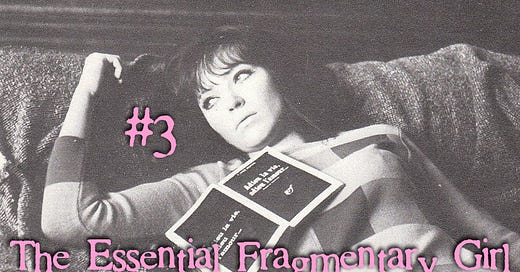The Essential Fragmentary Girl Reading List #3 - Essays
Two essential essays to read on feminism
As some of you may know (if you have read my post on readers block), I have been in a long reading slump but I have been told that I am being too hard on myself because I do actually read all the time. Turns out, I just don't read fiction anymore, I read essays. So, for this edition of The Essential Fragmentary Girl Reading List I will be musing about two of my absolute favourite essays.
Visual Pleasure and Narrative Cinema by Laura Mulvey, 1975
“In a world ordered by sexual imbalance, pleasure in looking has been split between active/male and passive/female. The determining male gaze projects its phantasy onto the female figure which is styled accordingly. In their traditional exhibitionist role women are simultaneously looked at and displayed, with their appearance coded for strong visual and erotic impact so that they can be said to connote to-be-looked-at-ness”
I am sure that many Fragmentary Girl readers have read this essay, it is truly an essential read if you are interested in anything I write about.
Visual Pleasure and Narrative Cinema is where it all began for me, when I first learnt about the male gaze theory at age 16 and made it my entire academic personality. In this essay, Mulvey discusses patriarchal control over the image of women in cinema, scopophilia and objectification, ideas around visual pleasure and female sexuality, and the power of the gaze. Mulvey states that a viewer of a film that portrays a female character in a sexualised way - through the lens of the male gaze (a phrase that she coins in this very essay) - gains pleasure from perceiving a woman as an object of desire. She uses Hitchcock’s Vertigo, Marnie and Rear Window as examples of the male gaze in cinema.
This essay is a psychoanalytic approach to the idea of pleasure in cinema as she references both Sigmund Freud (scopophilia) and Jacques Lacan (The Mirror Phase). Mulvey adopted Lacan’s idea of the gaze and “the mirror phase” - or simply the idea of self-awareness - when developing the male gaze, as female viewers of cinema become aware of the way they are viewed, presented and looked at by others. Mulvey’s essay reveals that women in cinema are victim to the gaze from every angle: the viewer or surveyor, the director and crew, the other actors and herself; women are programmed to view themselves from a secondary perspective (the patriarchal portrayal of women.)
I think this essay is brilliant and still so relevant. It would be wrong of me not to include it in an essential reading list as I reference it in nearly every essay I write (I don't know how it happens, she just creeps up on me the way Freud did all throughout my degree). I often find myself watching a film (most recently Eyes Wide Shut) and saying in my head “Laura Mulvey, you will always be famous.”
If you love this essay and Mulvey as much as I do, I would recommend reading The Female Gaze: Women as Viewers of Popular Culture by Lorraine Gamman and Margaret Marshment. This is an essay anthology based on Mulvey’s writing on the male gaze, looking at popular culture through that framework.
Uses of the Erotic: The Erotic as Power by Audre Lorde, 1978
“We have been raised to fear the yes within ourselves, our deepest cravings. For the demands of our released expectations lead us inevitably into actions which will help bring our lives into accordance with our needs, our knowledge, our desires. And the fear of our deepest cravings keeps them suspect, keeps us docile and loyal and obedient, and leads us to settle for or accept many facets of our oppression as women.”
I first read Audre Lorde in my feminist art history class during my final year at university. We were assigned Poetry is not a Luxury and Uses of the Erotic, I loved her writing so much and bought Sister Outsider to explore her more as a writer.
Uses of the Erotic is an essay that I think everyone should read. It is a short essay on the misconceptions of female sexuality and erotica in a patriarchal society. This essay expresses the importance of the erotic for women, emphasising that it isn't an exclusively sexual phenomenon, but something that can be translated and recognised in every aspect of your life; when you work, dance, create, speak, live. It is about love and joy, it is a sensation that you can feel in whatever brings you pleasure. Lorde describes the erotic as a “resource” that all women have within, calling it “a deeply female and spiritual plane”.
Lorde discusses the rejection of the female erotic in a patriarchal and western society. She relates its misconceptions by men to pornography, she says “We have often turned away from the exploration and consideration of the erotic as a source of power and information, confusing it with its opposite, the pornographic.” Lorde then says pornography entirely rejects the erotic as it represses the authentic and lived experience of the erotic; there is nothing real about it, it is contrived erotica, “sensation without feeling” as Lorde so perfectly describes it.
It is quite rare to read someone talk about female sexuality in such a refreshing and powerful way. Lorde treats it with such care and understanding, reclaiming and re-understanding the power of the erotic in women.
Thank you for reading! Don’t forget to subscribe to Fragmentary Girl so you never miss a new installment of my essential reading list. <3
A new essay will be coming out at the end of the month!




